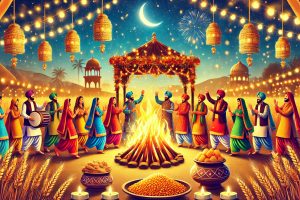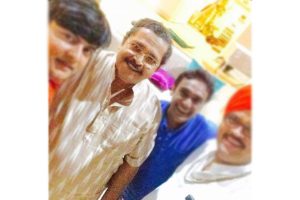
New Delhi: Once among the most popular art forms in the royal courts of Awadh, Thumri is still adored and followed by the lovers of Hindustani classical tradition. The adoration was evident as a packed audience turned up to listen to the renditions of Thumri from veteran as well as young exponents at Kamani Auditorium today.
The annual Thumri Festival, presented by Delhi Government’s Department of Art, Culture & Languages and Sahitya Kala Parishad brings together the maestros of this art form with some outstanding young talent.
Enthralling a packed audience of classical music lovers on the second evening of the festival was veteran exponent of Hindustani classical music Ustad Ghulam Sadiq Khan. A Padma Shri, Ustad Ghulam Sadiq Khan specializes in Khayal and Thumri gayaki and the veteran regaled the audience with his renditions.
Other vocalists who performed on the second day included the versatile singers Anjali Pohankar and Devasish Dey – both of whom are equally well versed in both classical as well as lighter and semi classical styles of singing such as Thumri, Dadra and Khayal.
The beauty of Thumri lies in the fact that it is semi-classical form of singing which appeals equally to the connoisseurs of classical music as well as those who prefer lighter musical art forms.
The festival ends tomorrow and the final evening will have young classical music exponents Uma Garg and Nabhodeep Chakroborty render the musical form. The festival will have a fitting finale when Girja Devi, the 84-year-old maestro of Thumri who has made immense contribution to the profile of this art form over several decades, takes the stage.
“Thumri is one of the most loved genres of Indian music which has a wide appeal. It is not only valued by an audience discerning enough to appreciate Hindustani classical music, but also appeals to the audience who might not be as well-versed in pure classical music. Despite much talk in recent years about the diminishing followers of the classical tradition, Thumri has always had its loyal audience,” says Girija Devi.
Thumri rose in popularity in the 19th century under the patronage of Nawab Wajid Ali Shah. Romantic and devotional in nature, the genre is a blend of Hindustani classical with traits of folk literature and music. The dohas of Indian bhakti poets form the core of the content of Thumri songs.
“Thumri is often an expression of the love for Lord Krishna and with time a number of lighter forms have emerged from its folds like Dadra, Chaiti, Hori, Kajari, Saavan and Jhoola. With its power to attract audiences, Thumri has been able to keep alive the tradition of Bhakti poets, despite emergence of new forms of entertainment. It becomes important to give a greater platform to artists who practice it and take it down generations. It is heartening to see young and fresh blood taking up the art form with zest,” says Ustad Ghulam Sadiq Khan.





